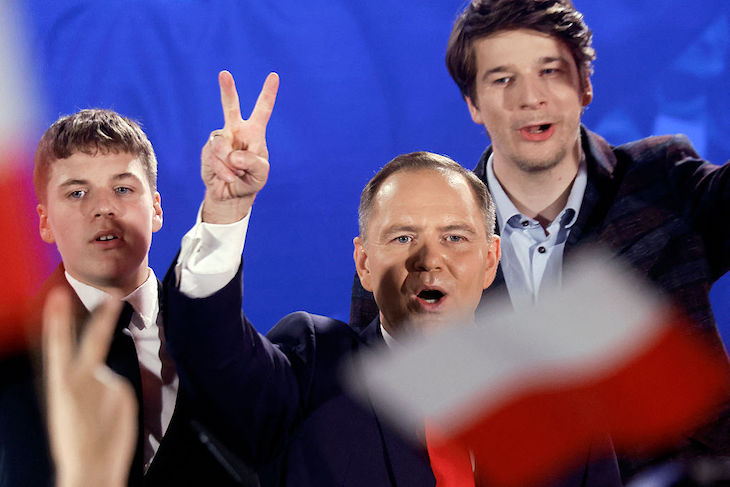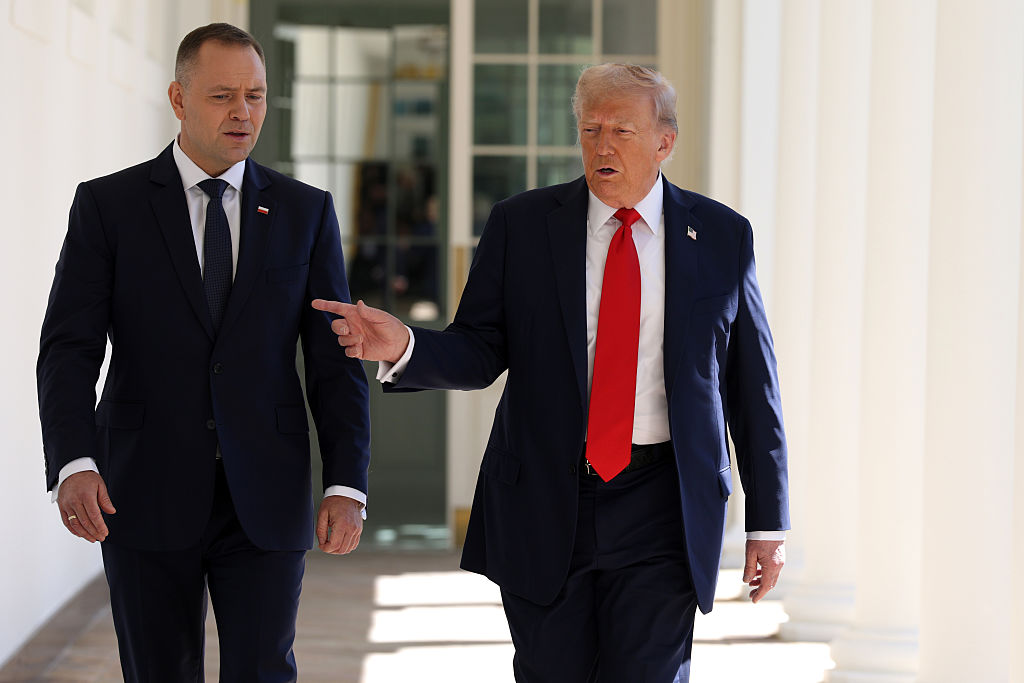Karol Nawrocki – the Law and Justice candidate – is the winner of Poland’s 2025 presidential election following a dramatic turn of events. Despite the final exit poll declaring Civic Platform’s Rafał Trzaskowski to be the winner by a margin of 0.6 percentage points, as the votes started coming in over the night, it was Nawrocki who ended up ahead with 51 percent of the vote. The Law and Justice candidate managed to overcome the odds to become president, but the result will likely be a political standstill that will leave both sides unhappy.
History does not repeat itself, but it sure loves to rhyme. In the 2020 Polish presidential election, the Law and Justice candidate – outgoing President Andrzej Duda – also received 51 percent of the vote. His rival then too was Trzaskowski, who repeated his performance five years later winning 49 percent of the vote. The difference this year was that Nawrocki was a weaker candidate than Duda. Trzaskowski should have been able to beat him. Duda was running for re-election and could boast about his superior experience. The 2020 election also took place at a time of record popularity for Law and Justice; the party was polling as high as 45 percent at the time. Nowadays, they tend to hover around 30 percent.
The two parties have been at each other’s throats
Trzaskowski had thought he’d won. When the exit poll came out in the evening of June 1, it declared 50.3 percent of the vote for Trzaskowski. Trzaskowski promptly announced victory, only for his dreams to be shattered when the results of the vote count started coming in. Those suggested that the exit poll overestimated Trzaskowski’s performance. The final result this morning was 50.9 percent for Nawrocki.
Much of Nawrocki’s overperformance is thanks to the candidate who came third in the first round of the election – Sławomir Mentzen. A candidate for the right-wing libertarian New Hope party, he won 15 percent in the first round. At the end of March, he was polling as high as 19 percent while the polls were showing only 20 percent for Nawrocki. There was a real chance that Mentzen, rather than Nawrocki, would enter the second round to go up against Trzaskowski, but over the last couple of months Mentzen’s campaign lost momentum.
Nevertheless, Mentzen levered his 15 percent perfectly. Shortly after the first round on May 18, he invited both Trzaskowski and Nawrocki to speak to him on his YouTube channel. Mentzen interviewed his two opponents and asked them to sign an eight-point declaration, including demands such as never agreeing to higher taxes, Ukraine’s accession into NATO or limiting freedom of speech. Both Nawrocki and Trzaskowski accepted the invitation, but only Nawrocki signed the declaration. In the end, 88.1 percent of the voters who voted for Mentzen in the first round elected to vote for Nawrocki in the second round.
This was hardly a given. Although non-Polish media outlets often equivocate Nawrocki and Mentzen, referring to both as right-wing populists, Mentzen’s New Hope party built its brand on opposing Law and Justice and is far to the right of Law and Justice on economics. In the 2020 presidential election, 48.5 percent of New Hope’s voters supported Rafał Trzaskowski in the second round. If Law and Justice comes into power while Nawrocki is still President, Nawrocki will likely have to abrogate his promises to Mentzen for Law and Justice to go through with almost any part of their fiscal policy program.
It is easy to be wise after the fact, but Civic Platform would likely have done better had they selected the veteran Radosław Sikorski – currently the Polish Minister of Foreign Affairs – to be their presidential candidate. Trzaskowski already lost in 2020, but Civic Platform party members voted him in as their candidate for 2025 anyway. In the Civic Platform primaries, Trzaskowski steamed ahead with 75 percent of the vote while Sikorski only got 25 percent. Sikorski could have presented himself to Nawrocki’s voters as a long-standing defender of Polish interests who has been instrumental to Poland’s defense and foreign policies since the 90s. Trzaskowski, on the other hand, has long been on the left of the center-left Civic Platform, vying for secularization, LGBT causes and less restrictive abortion laws throughout his time as the Mayor of Warsaw. Many people on the Polish right see him as the personalization of everything they despise: westernization, a Warsaw-centric, urban mindset and the forgoing of Polish values and sovereignty in favor of condescending liberalism and foreign interests. Sikorski also studied at Oxford with David Cameron and Boris Johnson and worked for the Daily Telegraph in the 80s. Better than Trzaskowski, he could have won over Mentzen’s libertarian supporters as he used to hold views very similar to their own.
Following Nawrocki’s victory, it will be difficult for Civic Platform – which remains in control of government – to push through with their policy program. The Polish president has the power to veto bills even after the Polish parliament has approved them. For them to then be enacted requires support from two-thirds of the Sejm – the lower chamber of the Polish parliament – but over a third of the Sejm seats are controlled by Law and Justice. The result is likely to be a policy standstill.
This may not be the worst thing in the world – Poland is doing well, all things considered, and new laws can make things worse. Poland already had a Law and Justice President and a Civic Platform Prime Minister, most notably between 2007 and 2010, and the country did just fine at the time.
My hope is that Nawrocki’s election forces Law and Justice and Civic Platform to again work together and reach a centrist compromise for the good of the country. Sadly this seems improbable. The two parties have been at each other’s throats, and, particularly since the constitutional crisis of 2015, they see each other as existential nemeses. Instead, at least until the next parliamentary election, Polish politics is likely to be at an impasse that satisfies nobody.

























